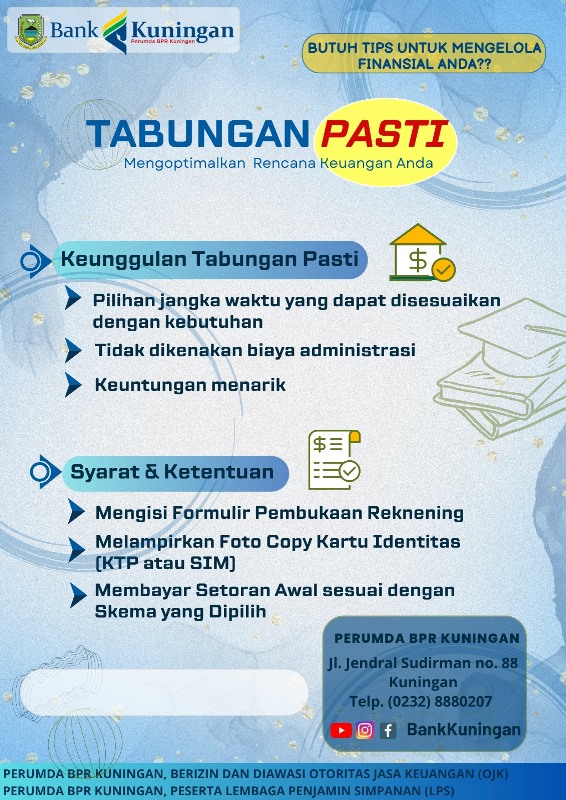KUNINGAN (MASS) – In this fast-paced digital era, almost all human life activities depend on the use of digital technology as the main intermediary. Digital technology is not just a complement but a major component in everyday life. The emergence of technology also makes everything easier, starting from managing and disseminating information. Today’s simple life has changed into a life that can be said to be more modern and instant to get anything from digital technology. Even in Indonesia, there are around 51.79% of people who use the internet to the point of having an impact on their lives. The development of technology can change human life in various spheres of life, from habits, lifestyles, and attitudes. The existence of the internet also makes it easier for someone to use digital devices because it helps fast access anywhere and anytime. Digital technology does provide convenience for human life, but behind that there are several negative impacts that threaten mental health, such as social pressure that triggers stress, addiction, disturbed sleep, and even decreased productivity. This problem cannot be allowed to continue because it will greatly affect mental health, especially for the younger generation. Therefore, to prevent these impacts, we can implement effective strategies such as setting screen limits and being more aware of the negative effects of digital technology (Suryoadji, K.A., et al. 2024).
The negative influence on the use of digital technology is social pressure that can trigger psychological disorders. The presence of several digital applications such as WhatsApp, TikTok, Instagram and other applications is indeed very helpful, especially for the younger generation today. However, frequent use of technology can reduce social interaction and the quality of face-to-face meetings, even when we meet other people, communication seems lacking because most people play with gadgets, even though social interaction is very important in building healthy social skills. Social pressure makes someone want to look perfect on social media, they post news or photos that may not be in accordance with reality just because they want to get validation through the number of likes and comments. This will cause feelings of fear, anxiety, depression, and fear of missing out on information (FOMO). With this incident, psychological problems due to uncontrolled gadget use have received serious attention, providing a balanced approach to the use of digital technology is needed, especially from educators and parents (Zamzami, R. M. 2024).
Gadget addiction is a phenomenon related to the excessive and uncontrolled use of smartphones. Excessive use of media can cause discomfort and will interfere with daily activities. A person who is already addicted to gadgets can spend most of their time with gadgets and even cannot be separated from gadgets. Teenagers who are already addicted to smartphones tend to forget their learning tasks and even forget their main needs, such as eating, drinking, or bathing. This is because users seem to be hypnotized by the ecosystem formed in the gadget (Aprilia, C. 2024). Smartphones are also always updated to a better and cooler version. This is all like a magnet that attracts someone to be attracted to the features on the smartphone so that the risk of addiction is prone to occur. Countries around the world recognize the urgency of addressing adolescent mental health issues that are increasingly exacerbated by gadgets. Educational institutions, mental health professionals and policy makers are implementing several strategies to promote digital health. Such as awareness campaigns, embedding digital literacy into education, and building systems that support those struggling with gadget addiction (Syam, A., et al. 2024).
The use of digital devices before bed can cause insomnia due to exposure to digital light and lack of control over working hours until late at night. Melatonin is a hormone in the body that helps a person sleep peacefully, but if this hormone is disturbed due to excessive use of digital devices, a person will experience sleep disorders such as insomnia, if it continues it will affect overall mental health. According to Sugitanata (in Af’idah, M. 2024), insufficient sleep can increase anxiety, reduce concentration, and even worsen mood. Excessive use of gadgets is one of the reasons for sleep disorders or difficulty sleeping. An individual’s desire to use gadgets is uncontrolled, so they tend to feel anxious and easily tired. To improve concentration, adequate sleep is needed because the impact of poor sleep quality, among others, will experience several negative things, such as accidents due to lack of focus, physical health problems, memory impairment, a high risk of obesity, and mental health problems. Adequate sleep can provide good quantities such as freshness and fitness when awakened. Research by Winarko, H. B. (2023) found a number of significant gender differences in consuming social media. In this study, women are more likely to experience insomnia, and this is inversely proportional to men (68% versus 32%). This incident is caused because in responding to content, women tend to involve emotional feelings in the use of social media, this of course results in anxiety and social pressure due to the use of social media. For example, reading news or seeing content that triggers discomfort in sleep can make the brain not stop thinking and make it difficult to rest. For this reason, a strategy is needed to maintain health, namely by limiting the use of gadgets and regulating the type of content consumed because this is very necessary to maintain mental balance and regular sleep patterns.
Overuse of technology can reduce productivity due to distraction and disorganized work patterns. Technology provides fast, flexible access over long distances, but according to research results Purnomo, H., & Aminuddin AP, R. A. (2025) indicate that many feel quickly tired and lose concentration after studying for several hours in front of the screen. Excessive study time in front of the screen affects a person’s concentration and focus level, they tend to get tired easily. When studying for too long, someone will feel sore, dizzy and even their eyes feel tired because they consume too much light from digital technology. This can hinder a person’s productivity. However, applying the principle of ergonomics is a step that can be taken, this principle provides comfort and safety in activities so that it will not interfere with a person’s productivity.
Properly planned strategies in the use of digital media can reduce depression and overcome mental health problems faced by a person. The importance of handling cooperation from various parties such as teachers whose role is to educate children while at school, the government can also support by providing public facilities used for activities related to children’s education, and especially parents who play a role in supervising their children when playing gadgets, not letting them play without supervision and controlling what applications or games children use, besides that parents also have the right to limit the time of playing gadgets so that children do not focus too much on gadgets, set good examples such as adjusting the brightness of the screen, not watching too close, and giving children the opportunity to play with their peers to avoid gadgets and be distracted from gadgets (Pramesti, A. F., et al. 2024).
Although digital technology provides convenience in various areas of life, this convenience contains various negative impacts such as social pressure, addiction, sleep disorders, and reduced productivity. These impacts make someone feel anxious, afraid, and even stressed. The existence of digital technology combined with the internet is currently prone to having negative effects on mental health, so an appropriate strategy is needed to overcome this. By limiting screen use, providing early education, and being more sensitive to the impacts of uncontrolled technology use, it is possible for someone not to easily fall into the dark side of technology.
Reference
Af’idah, Maslama. (2024). Mengoptimalkan Kesehatan Mental di Era Digital: Tips dan Trik. Maliki Interdisciplinary Journal, 2(11). Retrieved from https://urj.uin-malang.ac.id/index.php/mij/article/view/12084
Aprilia, C. (2024). Psikoedukasi Upaya Mengurangi Kecanduan Gadget pada Remaja di Smpn Satu Atap Suka Maju. Psikologiya Journal, 1(2), 20-30. https://doi.org/10.62872/wmx37023
Pramesti, A.F., Usman, I., Romdona, E.N., Putra, I.N., Mubarok, R., Rahma, N.A., Pratiwi, A.S., Ulwiyyah, H., Fatahna, R.A., Faadhilah, N., & Nugraha, R. (2024). Pendekatan Intradisipliner dalam Sosialisasi Bahaya dan Strategi Penanganan Kecanduan Gadget pada Anak di Garut. Jurnal Pengabdian Masyarakat Bangsa. https://doi.org/10.59837/jpmba.v2i7.1401
Purnomo, H., & Aminuddin AP, R. A. (2025). Optimalisasi Kesehatan dan Produktivitas Mahasiswa di Era Digitalisasi Melalui Intervensi Ergonomi: Tinjauan Terhadap Penggunaan Teknologi dalam Lingkungan Pendidikan. Journal Industrial Engineering and Management (JUST-ME), 5(02), 81–90. https://doi.org/10.47398/justme.v5i02.81
Sholahudin, U., & Agus, R.N. (2024). Sosialisasi Kesehatan Mental di Era Digital untuk Remaja Putri SMK Muhamadiyah Kota Cilegon. Seminar Nasional Pengabdian Masyarakat. https://doi.org/10.30656/senama.v1i.57
Suryoadji, K.A., Ali, N., Sutanto, R.L., Christian, C., Putra, E.N., Faruqi, M.H., Simanjuntak, K.T., A’yun, I.Q., Setyawan, D.A., & Suskhan, R.F. (2024). Kesehatan Mental di Era Digital: Tinjauan Naratif Dampak Media Sosial dan Teknologi Digital pada Kesehatan Mental dan Upaya untuk Mengatasinya. Jurnal Ilmiah Kesehatan. https://doi.org/10.33221/jikes.v23i1.3115
Syam, A., Zainal, S., Dewi, I., Wijayaningsih, K.S., & Musni, M. (2024). Generasi Sehat Digital: Menavigasi Kewaspadaan Kesehatan Mental dan Mengelola Kecanduan Gadget di Kalangan Pelajar. Faedah : Jurnal Hasil Kegiatan Pengabdian Masyarakat Indonesia. https://doi.org/10.59024/faedah.v2i1.71
Winarko, H. B. (2023). Kecemasan Digital: Penggunaan Media Sosial dan Dampaknya terhadap Kesehatan Mental Remaja Indonesia. Soetomo Communication and Humanities, 4(1), 12-19. https://doi.org/10.25139/sch.v4i1.9762
Zamzami, R.M. (2024). Dampak Teknologi Digital Terhadap Perilaku Sosial Generasi Muda. Techsi – Jurnal Teknik Informatika. https://doi.org/10.29103/techsi.v15i2.19443
By: Echi Septiasari | Student of Al-Ihya Islamic University Kuningan

































